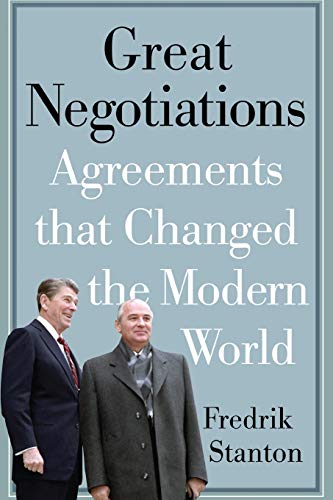
Great Negotiations
by Fredrik Stanton
"Agreements that Changed the Modern World"
Popularity
3.9 / 5
* A book's popularity is determined by how it compares to all other books on this website.
Where to buy?
Buy from Amazon* If you buy this book through the link above, we may receive a small commission at no extra cost to you.
Great Negotiations by Fredrik Stanton
Details
True Story:
Yes
Biography:
No
Published Date:
2011
ISBN13:
9781594161391
Description
Brief Summary
Great Negotiations by Fredrik Stanton is an insightful exploration of pivotal diplomatic moments that have significantly influenced world history. The book delves into eight critical episodes in modern diplomacy, examining how skillful negotiation can alter the course of events. From Benjamin Franklin's efforts to secure French support for the American revolution to the negotiations between Reagan and Gorbachev, Stanton illustrates how diplomatic dialogues have contributed to the shaping of national and international landscapes. Each episode highlights the strategic use of dialogue and negotiation over conflict and warfare, underlining the power of words in historical contexts.
Main Themes and Topics
The predominant theme in Great Negotiations is the power of diplomacy and strategic dialogue in shaping world events. Stanton focuses on key historical negotiations, illustrating how skilled negotiators have used tact, persuasion, and strategic dialogue to achieve significant outcomes. Through these well-researched episodes, Stanton emphasizes the importance of understanding cultural contexts, the art of compromise, and the necessity of patience in complex diplomatic situations. The book underscores that diplomacy often serves as a pivotal tool in conflict resolution and international relations, demonstrating that negotiations can be as decisive as military actions in altering historical trajectories.
Writing Style and Tone
Fredrik Stanton’s writing style in Great Negotiations is clear, engaging, and accessible, making complex diplomatic history approachable for both scholars and general readers. The author employs a narrative style that brings historical episodes to life without sacrificing depth or accuracy. His tone is informative and balanced, providing readers with a well-rounded understanding of each negotiation's significance and the characters involved. Stanton’s detailed recounting of historical events is coupled with insightful analysis, allowing readers to appreciate the intricacies of diplomatic strategies and their far-reaching consequences.
Criticism
While Great Negotiations is generally well-received for its informative content, some readers might find the book’s focus on historical diplomacy lacking in contemporary connections. The emphasis on historical episodes might feel somewhat removed from current global diplomatic challenges to some audiences. Additionally, readers seeking a more comprehensive examination of each negotiation’s broader geopolitical impacts might desire more expansive coverage on how these diplomatic strategies evolved over time beyond the highlighted episodes.









